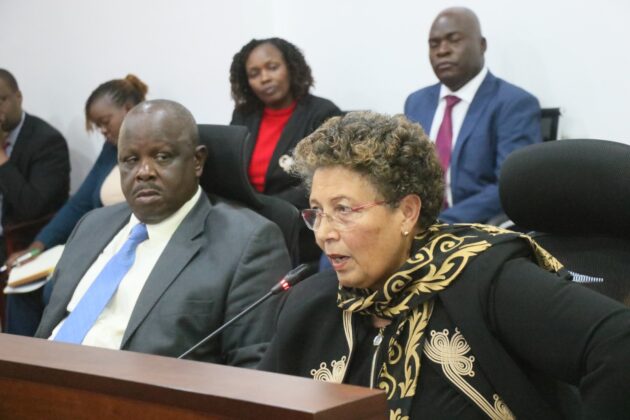
JSC Pushes for NG-CDF Support as Judiciary Battles 257,000 Case Backlog » Capital News
NAIROBI, Kenya Jul 17 – The Judicial Service Commission (JSC) is now urging Parliament to consider allocating part of the National Government Constituency Development Fund (NG-CDF) to support the construction of courts across the country, as the Judiciary grapples with a staggering 257,000 case backlog.
Appearing before the Constitutional Implementation Oversight Committee (CIOC) chaired by Tiaty MP William Kamket, JSC Vice Chair Isaac Rutto said conditional allocation from the NG-CDF could fast-track access to justice, especially in underserved areas.
“The NG-CDF can have a conditional allocation. It will make it possible for constituencies without courts to finally have them in place,” Rutto told the committee.
His remarks come in the wake of a recent High Court decision that declared the NG-CDF unconstitutional. In September 2024, Justices Kanyi Kimondo and Roselyn Aburili ruled that the fund contravenes the principles of separation of powers, dealing a blow to MPs who rely on the funds for local development.
The National Assembly now pushing for a constitutional amendment through parliamentary initiative to salvage it
Despite the legal wrangles, the fund has already supported the construction of 14 courts across the country, with three more under way built using Judiciary-issued prototypes and cost estimates.
Judiciary Chief Registrar Winfred Mokaya revealed that 16 other court projects have stalled due to lack of funds. She noted that the Judiciary’s long-term plan is to ensure every sub-county has a court, but chronic underfunding remains a major obstacle.
“The reality is the issue of underfunding but our plan is to have a court in each subcounty.We have 16 stalled projects due to funding,”said Judiciary Chief Registrar Winfred Mokaya.
Mokaya further disclosed that the Judiciary is struggling under the weight of 257,000 unresolved court cases, mostly civil, due to persistent underfunding and delayed budget disbursements.
She said the Judiciary currently receives less than 1 percent of the national budget, which is far from adequate to fulfill its constitutional obligations.
The shortage of funds, she added, limits the recruitment of judges and magistrates, hampers modernization of court infrastructure, and delays the rollout of digital case management systems.
“We have close to 257,000 court cases most of which are civil cases. This chronic underfunding limits our ability to recruit judges and magistrates and undermines the delivery of justice,” the Chief Registrar Winfred Mokaya told the committee.
The Judiciary operates 140 court stations nationwide and employs 302 judges far below the number needed to effectively serve a population of 55 million Kenyans.
Members of the oversight committee expressed concern over the mounting backlog, saying it is undermining public trust in the justice system. Nambale MP Geoffrey Mulanya questioned the Judiciary’s ability to fast-track appeals, pointing out that decisions in appeal cases often take up to five years.
“So what are you doing to ensure that this appeals are heard faster. The earliest a decision can come when it comes to appeal its usually four to five years. What can be done about this issue because its becoming totally untenable?” posed Nambale MP Geoffrey Mulanya.
Justice Fatuma Sichale, who represents the Court of Appeal at the JSC, noted that the Court of Appeal is among the most affected. Although the Judiciary is legally allowed to hire up to 70 appellate judges, budget constraints have limited the number to just 28.
Sichale explained that since the Supreme Court only handles a limited number of cases, nearly 98 percent of all matters are finalized at the Court of Appeal, putting immense pressure on its limited bench.
“Twenty eight judges serve 55 Million Kenyans and because jurisdiction of the supreme court is limited you find that 98 percent of the cases are finalized at the court of the appeal.So as court of appeal we act as a final court and that’s why the lifetime of appeals is five years,”Sichale stated.
The JSC is calling for a raft of reforms to address the crisis. These include the full operationalization of the Judiciary Fund to ensure direct disbursement from the Consolidated Fund, and pegging Judiciary and JSC funding at a minimum of 3.5 percent of the national budget through a constitutional or statutory amendment.
The commission also wants to be recognized as a direct beneficiary of the Judiciary Fund under Article 173 of the Constitution to eliminate interference from the Controller of Budget, which currently determines fund access.
In its submission to Parliament, the JSC said that the current arrangement where multiple government structures control Judiciary finances threatens judicial independence calling for legal intervention.